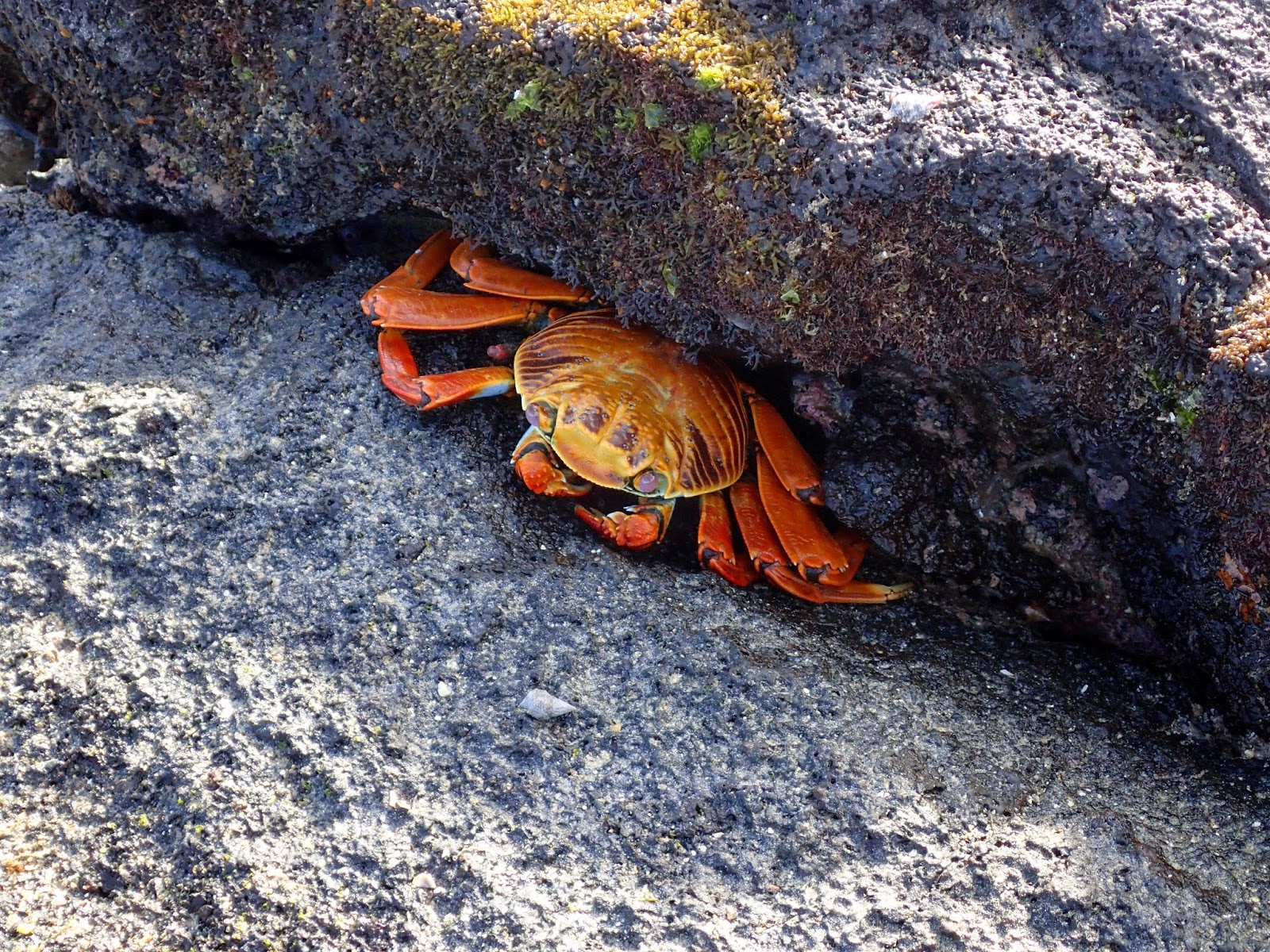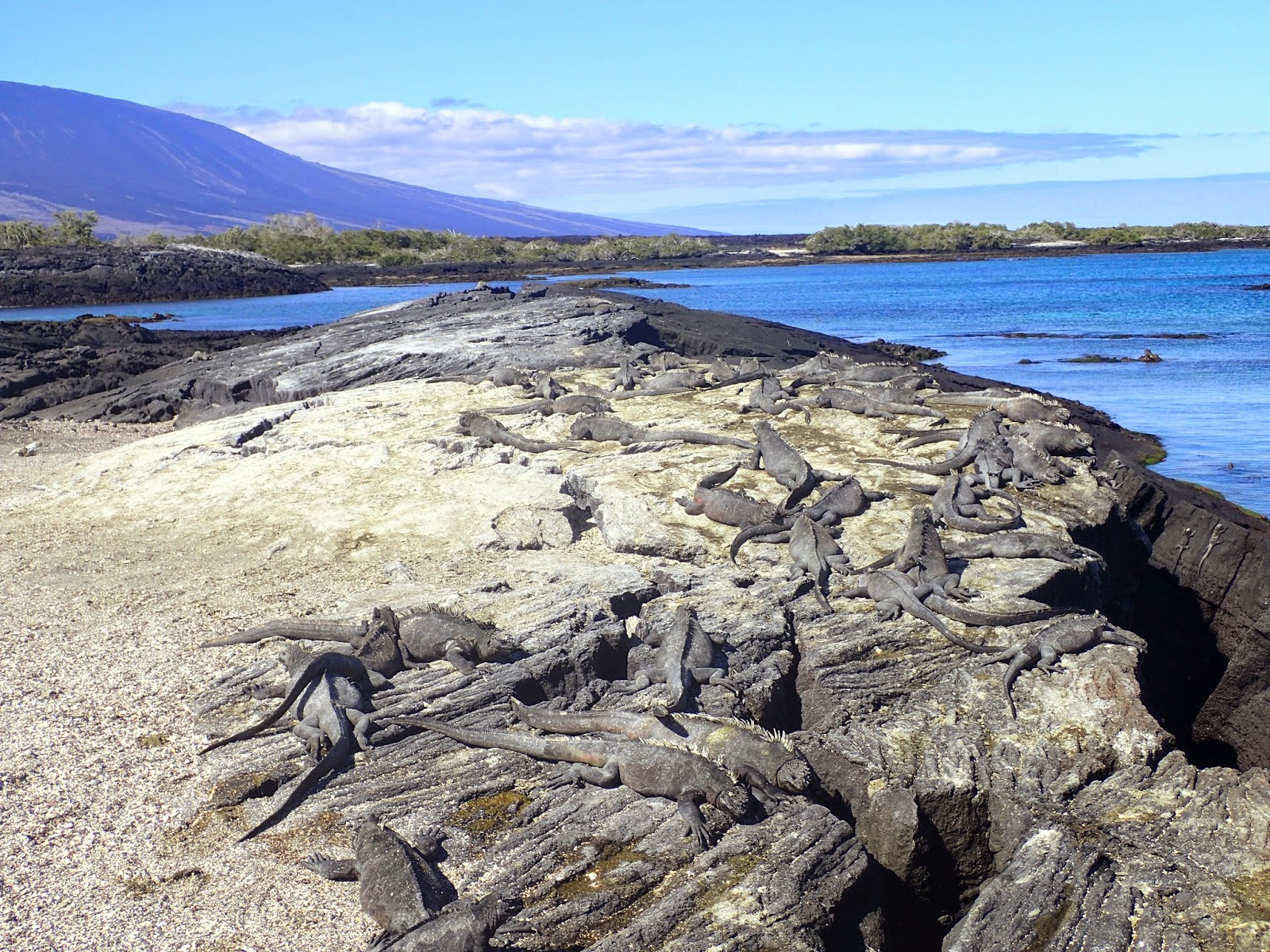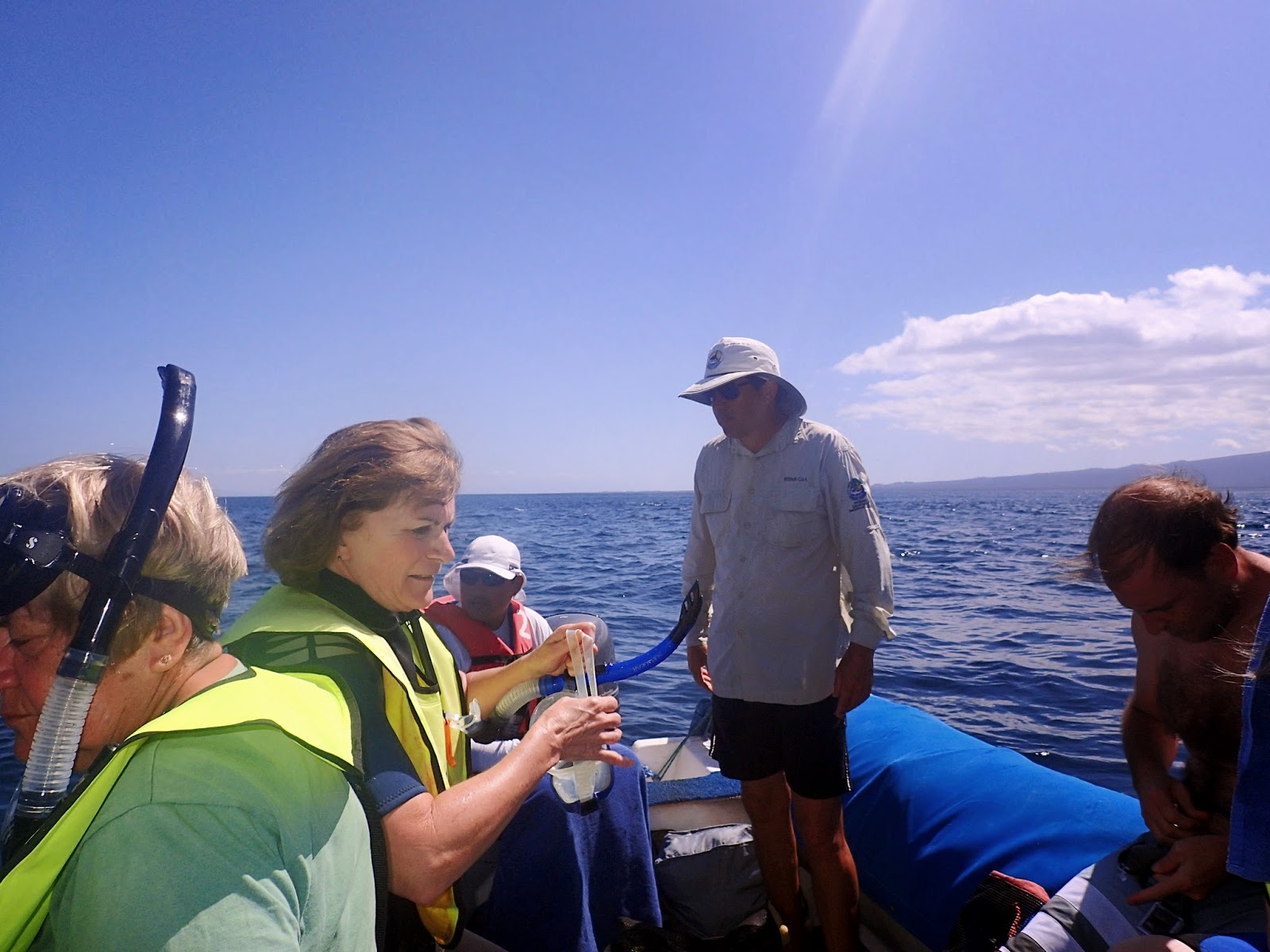Current travels of a 'wanabe' charity film maker in Galapagos, Ecuador.
Friday, 30 January 2015
FERNANDINA, GALAPAGOS, THE MOST PRISTINE ISLAND ON EARTH
November 23, 2014, (Visiting the most perfectly preserved
island in the world)
WHY ?????
Our cruise guidebook indicates that FERNANDINA is considered the best preserved and only pristine island in the world. It is considered thus because no species has been brought here by man. To date man has not introduced any species to the island.This small tract of land and its surrounding waters has the highest diversity of endemic fauna in the Galapagos. The waters are rich in "marine upwelling" caused by the arrival of the Cromwell Current laden with nutrients. The current brings large amounts of plankton to the surface providing a wealth of food for the animals.
It has the largest colony of marine iguanas in the Galapagos. It has all three types of mangrove trees (black, white and red) as well as cacti.
GETTING TO FERNANDINA
During the night our boat retraced its steps travelling north up the Bolivar Channel and anchored in the channel adjacent to Fernandina to our west. We took a dinghy ride to "make land" on EPINOSA POINT, FERNANDINA. All of this happened before 7 AM.
ARRIVING ON THE ISLAND
Weather conditions for our special day were perfect. We did a two hour strenuous walk mostly across uneven and cracked lava to see the superlative sights of the island.
We could look across the channel and view Volcan Ecuador on Isabela. Along with the stunning landscape, huge numbers of iguana and other thriving flora and fauna we also saw the remains of animals that didn't make it. Our guide thought that an el nino might be setting in thereby disturbing the food supply.
 |
The shoreline of Fernandina is made of large lumps of lava. I guess this is not surprising as Fernandina is the youngest Galapagos island. All of the islands were formed by erupting volcanoes |
 |
As we walked over the lava lands of Fernandina we had to sidestep many local creatures. This Sally Lightfoot crab was on the path |
 |
WHEN WE LOOKED IN FRONT OF US THERE WERE MARINE IGUANAS AS FAR AS THE EYE COULD SEE. SOME WERE TURNING RED IN PREPARATION OF MATING SEASON |
 |
THE SALLY LIGHTFOOT WAS RIGHT AT HOME AMONGST THE IGUANAS |
 |
THIS IGUANA IS COLOURFULLY READY TO ATTRACT HIS MATE |
 |
MURIEL AND I HIKED OVER THE LAVA, THROUGH THE IGUANAS AND ONTO SOME SAND |
 |
ON THE NEXT PATCH OF LAVA WE DISCOVERED THE SKELETAL REMAINS OF A WHALE |
 |
AND THEN MANY MORE IGUANAS |
 |
WE GOT QUITE USED TO BEING SURROUNDED BY IGUANAS |
 |
OUR FRIEND NEIL FELT VERY COMFORTABLE RESTING WITH THE ANIMALS |
 |
A SALLY LIGHTFOOT WAS LOOKING FOR SHADE UNDER A LAVA LEDGE |
 |
IT SEEMS THAT A PIECE OF MACHINERY WAS LEFT HERE LONG AGO |
 |
PLANT LIFE IS CREEPING ONTO THE LAVA. ACROSS THE CHANNEL VOLCAN ECUADOR IS VISIBLE ON ISABELA |
 |
PAINTING BY NATURE |
 |
ANOTHER PAINTING |
 |
AND ANOTHER |
 |
VOLCANO ECUADOR HAS A HALO OF CLOUDS |
 |
I COULDN'T DECIDE SO YOU HAVE THEM ALL. NOTE THE LITTLE SALLY LIGHTFOOTS IN THE FOREGROUND |
 |
A SEA LION ENJOYING A TIDAL POOL |
 |
IGUANAS, IGUANAS EVERYWHERE |
 |
THE MORE WE WALKED THE MORE WE SAW |
 |
THE INTREPID HIKER, MURIEL, MY SISTER AS SHE CHECKS IT ALL OUT |
 |
THIS LITTLE FELLOW HAS TO BRIDGE THE GAP. IT MUST LOOK LIKE A MIGHTY BIG GAP TO HIM |
 |
THE LAVA FORMED MANY INTRICATE PATTERNS |
 |
MANY BEAUTIFUL VIEWS ALONG THE HIKE ALL THE WAY BACK TO MEET OUR DINGHY |
 |
ALWAYS GREAT TO SEE THE WELCOMING DINGHY IN THIS LAND OF UNTOUCHED BEAUTY |
ALL OF MY POSTS OF BEAUTY TODAY ARE MADE IN MEMORY OF MY WONDERFUL BROTHER IN LAW PETER BOTHAM, HUSBAND OF MY SISTER MURIEL, WHO LEFT US SUDDENLY LESS THAN TWO DAYS AGO ON JANUARY 28. RIP DEAR PETER
Wednesday, 28 January 2015
Friday, 23 January 2015
UNDERWATER AND LAND VIDEO VISITS WITH ANIMALS OF MANY SHAPES AND SIZES
During our snorkelling trips in the pristine Pacific waters off the west coast of Isabela Island we saw many amazing sights. My friend, Neil, often filmed for me using the Gopro while I used an underwater Olympus with a zoom.
Some days we made as many as three trips into the water. The cooler Humboldt Current joins tropical waters in this area. The waters are several degrees cooler here than in other parts of Galapagos. Many snorkelers donned wetsuits.
Once suited up and in the water the depths were the limit. We could skim along the surface looking at the show beneath us or hold our breath and take dives to see and photograph something on the ocean floor. We could also tread water and get a good look at wildlife on the shore.
The entire time we were in this area we were the only people. We all felt fortunate to be sharing this adventure together.
My clips will show some of what we saw.
WATCH FOR THE BIG BLUE FISH WHO TAKES
CHARGE OF ALL OF THE LITTLE GUYS IN THE FIRST CLIP.
THE SECOND CLIP HAS US SWIMMING THROUGH CURTAINS OF FISH. THIS CLIP ILLUSTRATES THE PLENTIFULNESS OF FOOD.
Tuesday, 20 January 2015
TAGUS COVE, THE LAUNCH PAD FOR A HIKE TO DARWIN LAKE
Nov. 22/14 excursion to Tagus Cove continued. As we started the strenuous hike to Darwin Lake we had a chance to examine cliff graffiti from a closer point of view. Knowing that relatively few human beings had been here since their writing made the viewing special.
 |
As we approached the shore we could look up and see the animal activity |
 |
We looked up from the water to enjoy the view |
 |
A flightless cormorant is sharing space with a resting marine iguana |
 |
And underneath me I saw an awesome striped fish |
 |
And was also able to take a good look at this turtle's pretty head |
 |
We are back on board just in time to prep for another dinghy ride and a big hike to Darwin Lake |
 |
Checking out writings along the way |
 |
I imagine the writers, pirates and whalers from long ago |
 |
FINALLY WE ARRIVE AT DARWIN LAKE We followed the trail established in 1835 by the Darwin group when the Beagle anchored here in 1835. Darwin Lake is twice as salty as the ocean. |
 |
A closer look at Darwin lake |
 |
Darwin Lake is in the foreground. You can see our boat Galapagos Legend on the ocean in the background |
Thursday, 15 January 2015
ADVENTURING IN BOLIVAR CHANNEL CONTINUES
Nov. 22/14 was a fun filled highly energetic day. We started out with the Urbina Bay walk to see the largest species of Iguana in Galapagos, then did some deep water snorkelling, followed by a boat trip north to Tagus Cove. We jumped in for more snorkelling at Tagus Cove. We dinghied to land, checked out lots of graffiti and then did quite a strenuous hike to Darwin Lake.
To top the day off we we had a grand King Neptune party on the boat in the evening. Who would of ever thought we could manage four expeditions and a big party in one day. Lets start with the party and some on board socializing.
 |
WE BRAVED THE WINDY BARBQUE ON NOV. 21. NANCY AND NEIL HAD WIND BLOWN HAIRDOS |
 |
AND THEN THERE WAS GINNY OUR FAVOURITE GOLF PRO BROUGHT TO HER KNEES, CORRECTION- BELLY |
 |
THE COOKS BRAVED THE WIND TO COOK OUTDOORS |
 |
KING NEPTUNE RULED THE PARTY |
 |
| QUEEN RENATA DESERTED THE KING FOR THE SHIP'S DOCTOR |
TAGUS COVE AND DARWIN
Tagus Cove is a historical site visited by Darwin. Visitors over the past centuries have carved graffiti into the cove cliff walls until the Galapagos National Park was established in 1959. Tagus was the name of a British ship which anchored here in 1814 in search of giant tortoises to be used as a food supply on the boat.
Tagus Cove is a perfect place to drop anchor. It is protected by the surf. It was a resting place for pirates and whalers as well as it's most famous visitor Charles Darwin.
Charles Darwin had worked out a number of his evolutionary theories before visiting Galapagos in 1835. Here in Galapagos Charles was able to develop proof of his theories. The uniqueness of the islands, their isolation, their different elevations and the plentiful supply of species in varied states of development gave him the information he needed to proffer his theories.
The following signs in the Darwin Research Centre in Puerto Ayora give the setting for relatively rapid evolution in the Galapagos.
 |
NEIL TAKES A PICTURE OF SEA LIONS BASKING IN THE SUN AT TAGUS COVE. NOTE THE GRAFFITI ON THE CLIFFS |
 |
MORE GRAFFITI |
 |
MURIEL POSES WITH STATUE OF YELLOW IGUANA IN PUERTO AYORA |
 |
THIS MARINE IGUANA LOOKING OUT OVER URBINO BAY (as seen from a snorkelling position) TRULY IS THE "KING OF THE CASTLE" |
Subscribe to:
Comments (Atom)






